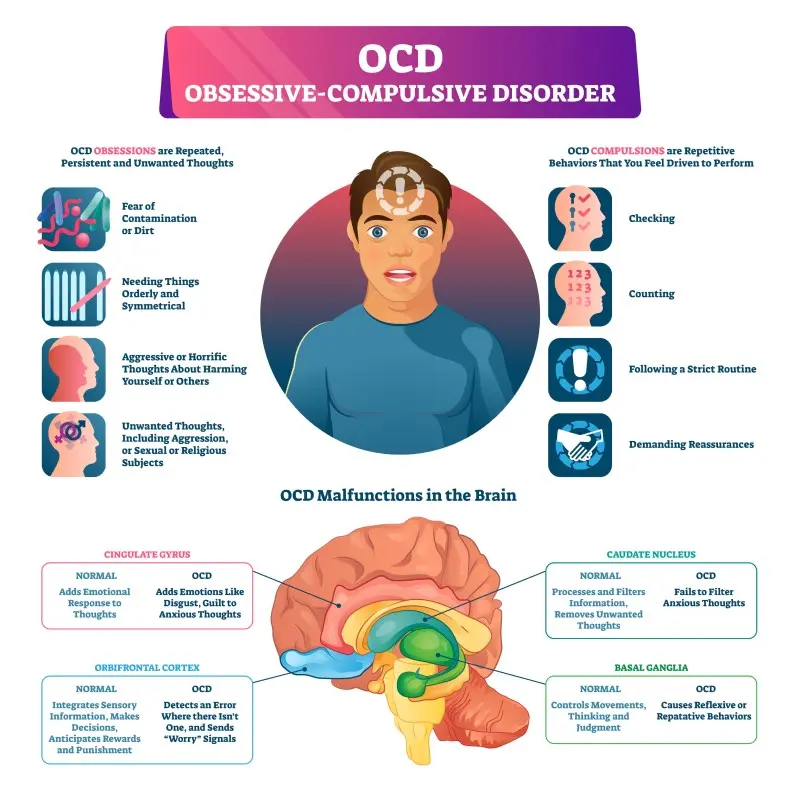The only MedSpa in Colorado backed by Medical Doctor, Anesthesiologist & 2022 Physician of the Year, Dr. Jan Gillespie.
The only MedSpa in Colorado backed by Medical Doctor, Anesthesiologist & 2022 Physician of the Year, Dr. Jan Gillespie.
Individuals with obsessive-compulsive disorder (OCD) experience persistent, intrusive thoughts and may feel compelled to repeat certain behaviors in response. At NoCo MedSpa & IV Therapy in Greeley, our team of Anesthesiologists and Anesthetists offer ketamine IV infusion therapy to help alleviate OCD symptoms. Contact us today or book an appointment online to discover if ketamine IV infusion therapy is suitable for you.
Obsessive-Compulsive Disorder (OCD) is a mental health condition that can affect individuals of any age, including children, adolescents, and adults. People with OCD experience persistent, intrusive thoughts known as obsessions, which often lead to repetitive behaviors called compulsions. These behaviors are performed in an attempt to alleviate the distress caused by the obsessions, but they often provide only temporary relief.
Individuals with OCD may exhibit one or both of the following symptoms:
Obsessions: These are recurrent, unwanted thoughts, images, or urges that cause significant anxiety or distress. Common obsessions include:
Compulsions: These are repetitive behaviors or mental acts that a person feels compelled to perform in response to an obsession or according to rigid rules. Common compulsions include:
The exact cause of OCD remains unknown, but several factors are believed to contribute to the development of the disorder. These factors include:
At NoCo MedSpa & IV Therapy, our specialized team offers tailored treatment plans to address OCD, focusing on innovative approaches such as ketamine infusion therapy. While traditional treatments like selective serotonin reuptake inhibitors (SSRIs) are available, they often do not address the underlying neural dysfunction. Ketamine, on the other hand, has shown promise in improving neural connectivity and overall brain function.
Ketamine Infusion Therapy:
Consultation and Assessment: Our experienced Anesthesiologist/Anesthetist team conducts a thorough consultation to evaluate whether ketamine infusion therapy is suitable for you. This assessment includes a detailed review of your medical history and current symptoms.
Customized Treatment Plan: If deemed appropriate, a personalized treatment plan is developed. Typically, this involves a series of six low-dose ketamine infusions, each lasting one hour.
Infusion Sessions: During each session, patients receive the infusion in a controlled, relaxing environment. The process includes 40 minutes of infusion followed by a 20-minute recovery period. Patients are closely monitored throughout the session to ensure safety and efficacy. Mild visual hallucinations and other temporary effects may occur but usually dissipate quickly.
Follow-Up and Maintenance: As patients show improvement, booster infusions may be recommended to maintain the therapeutic benefits. These boosters are usually scheduled 3-5 weeks after the initial series and are adjusted based on the patient’s response, symptom severity, and any concurrent medications.
If you are interested in learning more about how ketamine IV infusion therapy can help manage OCD, we encourage you to contact NoCo MedSpa & IV Therapy. Our dedicated team in Greeley, Colorado, is committed to providing effective treatments for depression and other symptoms, ensuring each patient receives the care they need.
Call us or book an appointment online today to take the first step towards managing your OCD and improving your quality of life.
OCD Affects Millions: Approximately 2-3% of the global population suffers from OCD, with symptoms often starting in childhood, adolescence, or early adulthood.
Gender Differences: While OCD affects both men and women, it is often diagnosed earlier in males, typically during childhood or adolescence, whereas it usually appears in females in their late teens or early twenties.
Comorbidity: OCD often coexists with other mental health disorders such as anxiety disorders, depression, and eating disorders, complicating diagnosis and treatment.
Genetic Links: Studies suggest that individuals with a first-degree relative (parent, sibling, or child) with OCD are at higher risk of developing the disorder themselves, indicating a strong genetic component.
Impact on Daily Life: OCD can severely impact daily functioning, with individuals spending significant amounts of time on their obsessions and compulsions, which can interfere with work, school, and personal relationships.
Treatment Resistance: Approximately 40-60% of individuals with OCD do not respond adequately to traditional treatments like SSRIs, highlighting the need for alternative therapies such as ketamine infusion therapy.
Brain Activity: Neuroimaging studies have shown that people with OCD often have increased activity in specific brain regions, such as the orbitofrontal cortex, anterior cingulate cortex, and caudate nucleus, which are involved in decision-making, error detection, and habit formation.
Myth vs. Reality: Contrary to popular belief, OCD is not just about being neat and orderly. It involves intense anxiety and distress caused by intrusive thoughts and the urgent need to perform certain behaviors to alleviate that distress.
Early Intervention: Early diagnosis and treatment of OCD can significantly improve outcomes, reducing the severity of symptoms and helping individuals lead more fulfilling lives.
